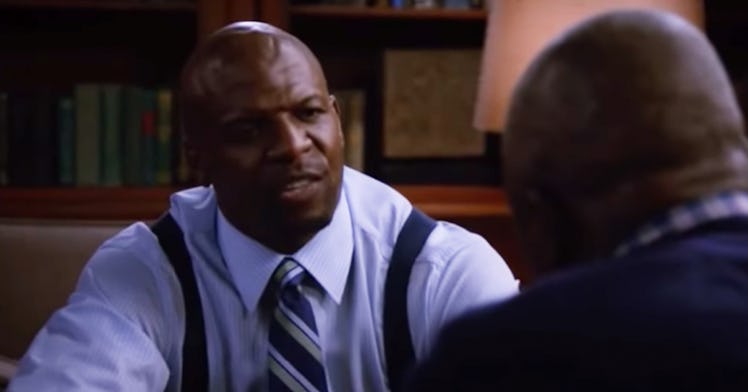Let’s Talk About That ‘Brooklyn Nine-Nine’ Scene That’s Going Around
A show that makes cops hilarious heroes is hopelessly out of step right now.

In “Moo Moo,” a season four episode of Brooklyn Nine-Nine, bulky but soft-hearted police sergeant Terry is searching the streets at night for his daughter’s titular blanket, lost out of a car window on the ride home. He’s stopped by a police officer who finds the muscular black man suspicious, and escapes jail only because he’s a cop.
Terry later opens up to his boss, the black, gay Captain Holt, about the trauma of the experience and the sadness he felt knowing that his daughters would grow up in a world where something like that could happen. It’s this scene that’s making the rounds on social media in the wake of George Floyd’s death.
This kind of serious subject matter is a departure for the show, which is about as light-hearted as a sitcom can be despite being set in a police precinct. “Moo Moo” aside, it usually has nothing to say about the difficult realities of police work, particularly in a city where marginalized people are oppressed by the police every single day. And when it does, it doesn’t have great things to say. Case in point: a season one episode that features, sympathetically, a race to find evidence on an arrested suspect before habeas corpus kicks in and the cops have to let him go.
Unfortunately, the fact that the show ignores or makes light of real-life policing in Brooklyn means, purposefully or not, that it perpetuates a narrative that the NYPD wants perpetuated: The cops are the good guys, and bad cops are few and far between.
It’s a narrative that the events of the past week have revealed to be bullshit. Good guys don’t drive SUVs into crowds, they don’t spray tear gas at peaceful protestors to clear the way for a presidential photo op, they don’t attack members of the media, and they don’t kneel on the neck of a citizen, ignoring desperate pleas that he can’t breathe, until he is dead.
Brooklyn Nine-Nine puts all of your sympathies with cops whose real-life counterparts clearly don’t deserve them. A racist incident, what any real police sergeant knows on some level is incredibly common, is framed as a destabilizing event, the crime of one bad apple, not a systemic problem. Despite what posters drawn to the subject matter of “Moo Moo” might think, it’s the exact wrong show for a moment in which police violence is widespread, arbitrary, and horrifying.
You could argue that Brooklyn Nine-Nine deserves to be let off the hook because it’s fiction and an unserious sitcom at that. Fans of the show, seeking to keep a source of comfort separate from the awful reality of the world, are doing just that.
Their impulse is understandable but dangerous. After all, positive portrayals of police officers affect perceptions of the real cops, who have proven this week for the millionth time that they deserve more criticism, not less.
Pointing to an unrealistic, uncritical portrayal of the NYPD as perfect for this era of widespread police abuse doesn’t do any favors for the people suffering the brunt of that abuse. Increased skepticism of copaganda in all forms, from the officers who kneel in solidarity before teargassing crowds to most of the CBS lineup to a silly sitcom about a police precinct, is a necessary step toward a future in which the officers of Brooklyn Nine-Nine might more closely resemble their real-life counterparts.
Update 6/2: To her credit, Stephanie Beatriz, who plays Rosa on Brooklyn Nine-Nine donated $11,000 to the National Bail Fund Network. She also announced that “something” would be coming from the cast of the show with the hashtag #BlackLivesMatter.
Update 6/3: Beatriz announced that the “cast and showrunner” of the show donated $100,000 to the National Bail Fund Network.
This article was originally published on